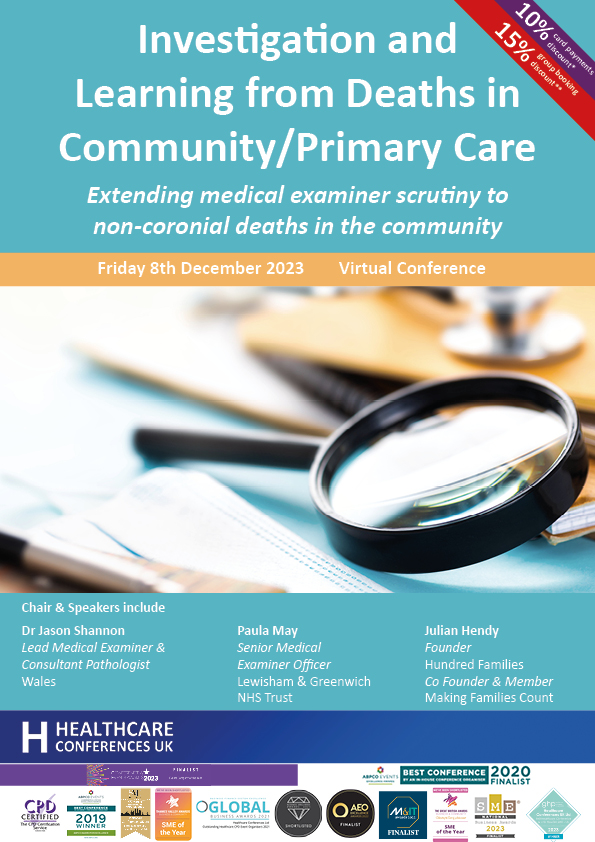Find out more about virtual attendance
Follow the conference on Twitter #LearningfromdeathsPC
This conference focuses on investigating and learning from deaths in the community/primary care.
By 2024, all deaths in the community or acute settings that do not required to be referred to the coroner (non-coronial deaths) will need to be scrutinised by a medical examiner. The conference focuses on the extension of the Medical Examiner role to cover deaths occurring in the community and the role of the GP in working with the Medical Examiner to learn from deaths and to identify constructive learning to improve care for patients.
"The majority of in-hospital deaths are now scrutinised and the process is rolling out to include all community deaths. It is expected that the process will become statutory by 2024 when every death within England and Wales will be reviewed either by the Medical Examiner or HM Coroner."
“Medical examiners are already delivering benefits including fewer rejected MCCDs, improved referrals to coroners, improvements to patient care, and positive feedback from certifying doctors and bereaved people. Potential benefits for GPs include:
• Supporting the bereaved: For GPs, this can reduce workload by taking care of enquiries and follow-ups. This does not replace GPs speaking with families or next of kin, and providing the support they wish to give.
• Support with MCCD completion: specialist training and understanding of the MCCD and death certification processes means medical examiners can reduce the burden associated with coroner notifications from GP practices.
• Supporting work with coroners’ offices: medical examiners are a source of medical advice for coroners, which should reduce requests from coroners for GPs to discuss cases or to advise on wording.
• Reduce administration: if agreed locally, medical examiner officers can carry out administrative tasks relating to death certification.
• Timely completion of scrutiny: medical examiners complete their scrutiny in a timely manner to facilitate registration within five days.
• Examination of the deceased: the Coronavirus Act introduced easements to the process of certifying deaths. There is no new mandatory requirement for examination of the deceased by GPs in the medical examiner system.
• Complex cases: Medical examiners will support the doctor completing the MCCD, drawing on their extensive knowledge gained through training and regular exposure to more complex scenarios to support and advise. This will assist GPs in completing MCCDs accurately in more complex cases.
• Urgent release of the body: medical examiners will develop positive relationships with contacts in faith communities, and will be able to support GPs if there are requests for urgent issue of the MCCD.
• Clinical governance; where issues are detected, medical examiners will offer non-judgmental feedback. Their aim is not to find fault or review in unnecessary detail.
• Concerns and learning; a key objective for the medical examiner system is to identify constructive learning to improve care for patients.”
This conference will enable you to:
- Network with colleagues who are working to improve practice in the investigation and learning from deaths in the community
- Reflect on the lived experience of a carer on how we can best involve bereaved relatives
- Learning from deaths during Covid-19
- Understand the role of the Medical Examiner in Primary/Community care and how they can support GPs
- Update your knowledge on the new Patient Safety Incident Response Framework (PSIRF)
- Understand national developments and national reporting and notification requirements, including the advice from a current Coroner
- Identification and reporting of deaths and the role of the Medical Examiner
- Reflect on how you improve involvement of families and carers
- Effectively support staff when a death occurs including supporting staff through coroner inquests
- Self assess your learning from deaths process and ensure investigations lead to change
- Supports CPD professional development and acts as revalidation evidence. This course provides 5 Hrs training for CPD subject to peer group approval for revalidation purposes


